- Home
- Gustave Aimard
The Adventurers Page 5
The Adventurers Read online
Page 5
CHAPTER IV.
THE EXECUTION.
Towards the end of the year 1450, Chili was invaded by PrinceSinchiroca, afterwards Inca, who gained possession of the valley ofMapocho, then called Promocaces, that is to say, the place of dancingand rejoicing. The Peruvian government, however, was never able toestablish itself in the country, on account of the armed opposition ofthe Promocians, then encamped between the rivers Rapel and Maule. Hence,though the historian Garcilasso de la Vega may place the limits of theterritory conquered by the Incas upon the river Maule, everything provesthey were upon the Rapel, for, near the confluence of the Cachapeul withthe Tingerica, which from this point takes the name of Rapel, start theruins of an ancient Peruvian fortress, constructed exactly like those ofCallao and Asseray, in the province of Quito. These fortresses served tomark the frontier.
The Spanish conqueror, Don Pedro de Valdivia, founded, on the 24th ofFebruary, 1541, the city of Santiago in a delightful position upon theleft bank of the Rio Mapocho, at the entrance of a plain a hundred milesin extent, bounded by the Rio Parahuel, and the mountain of El Pardo,which has an elevation of not less than four thousand feet. This plain,which is also bathed by the Rio Maypo, forms a natural reservoir, inwhich the light soil brought down from the neighbouring heights hasfound a level, and created one of the richest territories of the NewWorld.
Santiago, which at a later period became the capital of Chili, is one ofthe finest cities in Spanish America. Its streets are broad, built instraight lines, and refreshed by _acequias_; or rivulets of clear andlimpid water; while the houses, built of _adobes_, only one story high,on account of the earthquakes so frequent in this country, are vast,airy, and well situated. It possesses a great number of monuments, themost remarkable of which are the stone bridge of five arches, thrownover the Mapocho, and the Tajamar, or breakwater, formed of two brickwalls, the interior one of which is filled with earth, and serves toprotect the inhabitants from inundations. The Cordilleras, with theireternally snow-crowned summits, although eighty miles distant fromthe city, appear suspended over it, and present an aspect of the mostmajestic and imposing kind.
On the 5th of May, 1835, towards ten o'clock in the evening, stiflingheat oppressed the city; there was not a breath in the air, or a cloudin the heavens. Santiago, generally so joyous at this hour of thenight, when beams from black eyes and smiles from rosy lips are seen atevery balcony, and each window seems to challenge the passer-by withthe twanging of _sambecuejas,_ and snatches of Creole songs, appearedplunged in the deepest sadness. The balconies and the windows werefilled, it is true, with the heads of men and women, packed together asclosely as possible, but the expression of every face was serious, everylook was thoughtful and uneasy: no smile, no joy could be witnessed; buton all sides were sorrowful brows, pale cheeks, and eyes filled withtears.
Here and there in the streets numerous groups were stationed in themiddle of the causeway, or upon the steps of the doors, conversing in alow voice, but with great vivacity. At every instant, orderly officersleft the government palace, and galloped off in various directions.Detachments of troops quitted their barracks, and marched, with drumsbeating, to the Plaza Mayor, where they formed in line, passing silentlyamidst the terrified inhabitants. The Plaza Mayor on this eveningafforded an exceptional appearance. Torches, waved about by individualsmixed with the crowd, threw their red dull reflections upon theassembled people, who seemed to be in expectation of some great event.
But among all these people assembled on one spot, and whose numberincreased every second, not a cry, not a word could be heard. Only, atintervals, there arose a nameless murmur--a noise of the sea before atempest--the whisper of a whole anxious people--the hoarse fury of astorm lashing all these oppressed breasts. The clock of the cathedralheavily and slowly struck ten.
Scarce had the _serenos_, according to custom, chanted the hour, eremilitary commands were heard, and the crowd violently driven back in alldirections, with cries and oaths, accompanied by blows from gunstocks,divided in two nearly equal parts, leaving between them a wide, freespace. At this moment arose the sounds of religious chants, murmured ina low, monotonous tone, and a long procession of monks debouched uponthe square. These monks all belonged to the order of the Brothers ofMercy. They walked slowly in two lines, with their hoods pulled downover their faces, their arms crossed upon their breasts, their headshanging down, and chanting the _De Profundis_. In the middle of them tenpenitents each bore an open coffin. Then came a squadron of cavalry,preceding a battalion of militiamen, in the centre of which body, tenmen, bare headed, with their arms bound behind them, were conducted,each riding with his face toward the tail of a donkey, whose bridlewas held by a monk of the order of Mercy; a detachment of lancers cameimmediately after, and closed this lugubrious procession.
At the cry of halt, given by the commander of the troops drawn upupon the Plaza, the monks separated to the right and left, withoutinterrupting their funeral chant, and the condemned remained alone inthe middle of the space left free for them. These men were patriots,who had attempted to overthrow the established government, in order tosubstitute another, the more broad and democratic basis of which wouldbe, as they thought, in better accordance with ideas of progress and thewelfare of the nation. These patriots belonged to the first families ofthe country.
The population of Santiago viewed with sullen despair the death ofthe men whom they considered as martyrs. It is even probable that arising in their favour would have taken place, if General Don PonchoBustamente, the minister at war, had not drawn out a military forcecapable of imposing upon the most determined, and obliging them to besilent spectators of the execution of men whom they could not save, butwhom they entertained a fierce hope of avenging at a future day.
The condemned alighted; they piously knelt, and confessed themselves tothe monks of Mercy nearest to them, whilst a platoon of fifty soldierstook up a position within twenty paces of them. When their confessionwas completed, they rose up bravely, and taking each other by the hand,ranged themselves in a single line in front of the soldiers appointedto put them to death. In spite, however, of the great numbers of troopsassembled on the Plaza, an ominous fermentation prevailed among thepeople. The crowd rocked about in all directions. Murmurs of sinisteraugury and curses, pronounced aloud against the agents of power, seemedto remind the latter that they had better finish the affair at once, ifthey did not wish to have their victims torn from their hands.
General Bustamente, who calmly and stoically presided over thisdismal ceremony, smiled with disdain at this expression of populardisapprobation. He waved his sword over his head and commanded "rightabout face," which was executed with the rapidity of lightning. Thetroops faced the insurgents on all sides; the front rank pointing theirmuskets at the citizens crowded together before them, whilst the othersappeared to take aim at the balconies encumbered with people. This wasfollowed by so dead a silence, that not a word was lost of the sentenceread by the proper officer to the patriots--a sentence which condemnedthem to be shot as traitors, or accomplices in a conspiracy designedto overthrow the constituted government, and plunge their country intoanarchy.
The conspirators listened to their sentence with silent firmness; butwhen the officer, who trembled in every limb, had finished reading it,they all cried, as with one voice,
"Viva la Patria! Viva la Libertad!"
The General gave a signal, and a loud rolling of the drums drowned thevoices of the condemned. A discharge of musketry resounded like a clapof thunder, and the ten martyrs fell, once again shouting their cry ofliberty, a cry doomed to find an echo in the hearts of their terrifiedcompatriots.
The troops filed off, with shouldered arms, ensigns flying, and band attheir head, past the dead bodies, and regained their barracks. When theGeneral had disappeared with his escort, and the troops had left thePlaza, the people rushed in a mass towards the spot where the martyrsof their cause lay in a confused heap. Every one wished to offer them alast farewell, and to swear over their bo
dies to avenge them, or to fallin their turn.
At length, by degrees, the crowd became less compact, the groupsdispersed, the last torches were extinguished, and the spot where,scarce an hour before, an awful drama had been accomplished, was leftcompletely deserted. A considerable time elapsed before any noisedisturbed the solemn silence which brooded over the Plaza Mayor.
Suddenly, a heavy sigh escaped from the heap of bodies, and a pale head,disfigured by the blood and dirt which stained it, arose slowly fromthis human slaughterhouse, pushing aside with difficulty the carcasseswhich had covered it. The victim, who, by a miracle, survived thisbloody hecatomb, cast an anxious look around him, and passing his handover his brow, which was bathed in a dark perspiration, said vehemently--
"My God! my God! grant me strength to live, that I may avenge myself andmy country!"
Then, with incredible courage, this man, too weak from the blood he hadlost, and was still losing, to stand, or to escape by walking away,began to crawl along upon his hands and knees, leaving behind him a longwet track, and directing his course towards the cathedral. At every yardhe stopped to take breath, and to place his hands upon his wounds, whichmotion rendered more painful. Scarce had he left the centre of the Plazaand its horrid sacrifice fifty paces behind him, and that with immensedifficulty, when, from a street which opened just before him, issued twomen, who advanced with hasty steps towards him.
"Oh!" the unhappy man cried, in utter despair, "I am lost! I am lost!Heaven is not just!"--And he fainted.
The two men, on coming up to him, stopped with great surprise; theyleant over him, and examined him with care and in an anxious manner.
"Well?" said one of them, at the end of a minute or two.
"He is alive!" the other replied, in a tone of conviction.
Without uttering another word, they rolled up the wounded man in a_poncho_, lifted him on their shoulders, and disappeared in the gloomydepths of the street by which they had come, and which led to theCanadilla suburb.

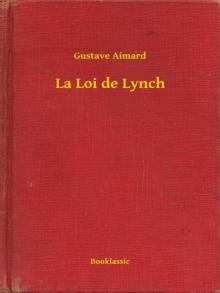 La loi de lynch. English
La loi de lynch. English The Guide of the Desert
The Guide of the Desert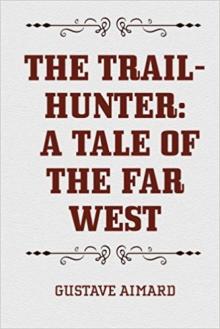 The Trail-Hunter: A Tale of the Far West
The Trail-Hunter: A Tale of the Far West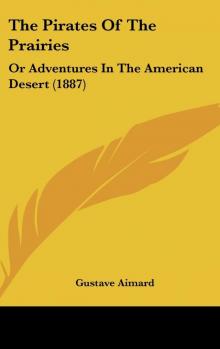 The Pirates of the Prairies: Adventures in the American Desert
The Pirates of the Prairies: Adventures in the American Desert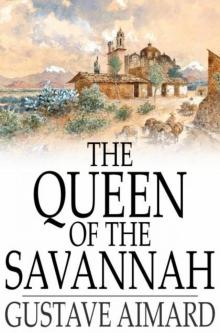 The Treasure of Pearls: A Romance of Adventures in California
The Treasure of Pearls: A Romance of Adventures in California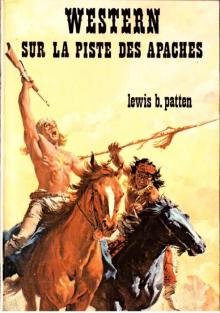 Les outlaws du Missouri. English
Les outlaws du Missouri. English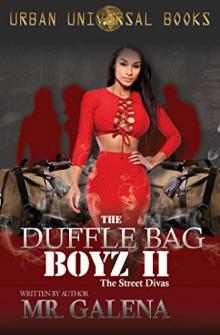 Les trappeurs de l'Arkansas. English
Les trappeurs de l'Arkansas. English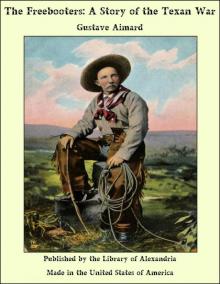 The Border Rifles: A Tale of the Texan War
The Border Rifles: A Tale of the Texan War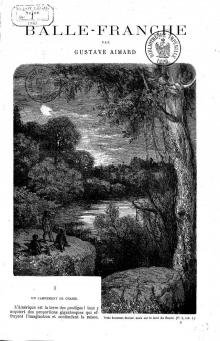 Balle-Franche. English
Balle-Franche. English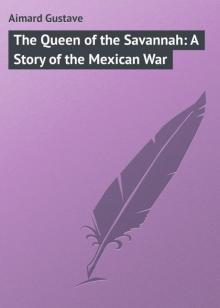 The Queen of the Savannah: A Story of the Mexican War
The Queen of the Savannah: A Story of the Mexican War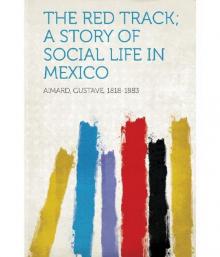 The Red Track: A Story of Social Life in Mexico
The Red Track: A Story of Social Life in Mexico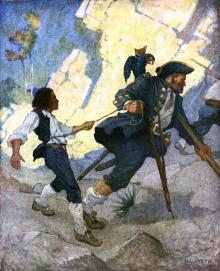 La fièvre d'or. English
La fièvre d'or. English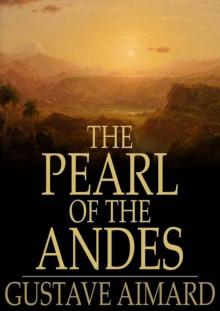 The Pearl of the Andes: A Tale of Love and Adventure
The Pearl of the Andes: A Tale of Love and Adventure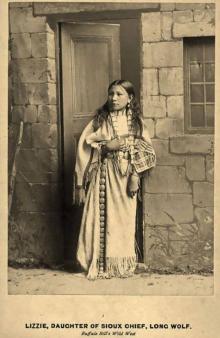 Les fils de la tortue. English
Les fils de la tortue. English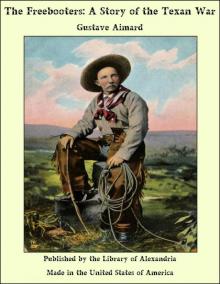 The Indian Chief: The Story of a Revolution
The Indian Chief: The Story of a Revolution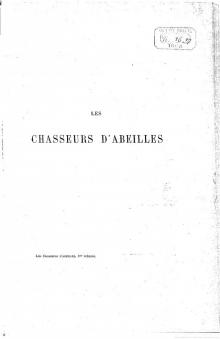 Les chasseurs d'abeilles. English
Les chasseurs d'abeilles. English The Adventurers
The Adventurers